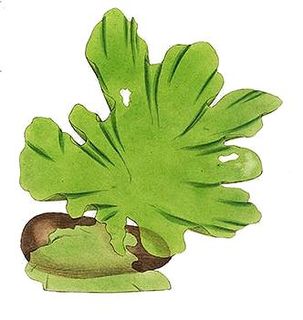
The sea lettuces comprise the genus Ulva, a group of edible green algae that is widely distributed along the coasts of the world's oceans. The type species within the genus Ulva is Ulva lactuca, lactuca being Latin for "lettuce". The genus also includes the species previously classified under the genus Enteromorpha, the former members of which are known under the common name green nori.

Porphyra is a genus of coldwater seaweeds that grow in cold, shallow seawater. More specifically, it belongs to red algae phylum of laver species, comprising approximately 70 species. It grows in the intertidal zone, typically between the upper intertidal zone and the splash zone in cold waters of temperate oceans. In East Asia, it is used to produce the sea vegetable products nori and gim. There are considered to be 60 to 70 species of Porphyra worldwide and seven around Britain and Ireland where it has been traditionally used to produce edible sea vegetables on the Irish Sea coast. Porphyra is a chief source of plant-based vitamin B12.

Cystoseira is a genus of brown algae in the order Fucales.
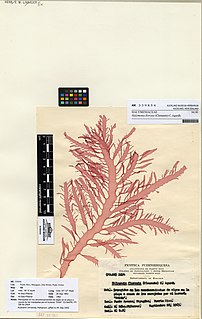
Halymenia a genus of a macroscopic red algae that grows in oceans worldwide. It includes the following species:

Nitella is a genus of charophyte green algae in the family Characeae.

Plocamium is a genus of red algae in the family Plocamiaceae. It contains around 40 species and has a cosmopolitan distribution in temperate seas. Plocamium has erect elliptical thalli that grow up to 50 cm (20 in) in length. They are bright red in color with strongly flattened delicately branching fronds that further divide into two to five smaller branchlets.
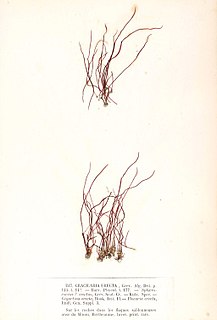
Cordylecladia erecta is a species of red algae in the family Rhodymeniaceae. It is found in the north east Atlantic Ocean and the Mediterranean Sea and is the type species of the genus.
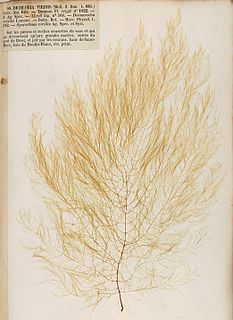
Desmarestia is a genus of brown algae found worldwide. It is also called acid weed, acidweed, oseille de mer, sea sorrel, ウルシグサ, stacheltang, mermaid's hair, landlady's wig, or gruagach. However, 'sea sorrel' can also specifically refer to Desmarestia viridis. Members of this genus can be either annual or perennial. Annual members of this genus store sulfuric acid in intracellular vacuoles. When exposed to air they release the acid, thereby destroying themselves and nearby seaweeds in the process. They are found in shallow intertidal zones.

Phyllophora is a genus of red algae in the family Phyllophoraceae.

Dictyota is a genus of seaweed in the family Dictyotaceae. Species are predominantly found in tropical and subtropical seas, and are known to contain numerous chemicals (diterpenes) which have potential medicinal value. As at the end of 2017, some 237 different diterpenes had been identified from across the genus.
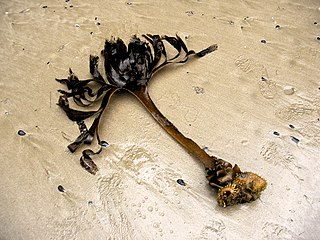
Phyllariaceae is a family of brown algae in the order Tilopteridales.

Ptilonia(Harvey) J. Agardh, 1863 is a genus of red algae in the family Bonnemaisoniaceae.
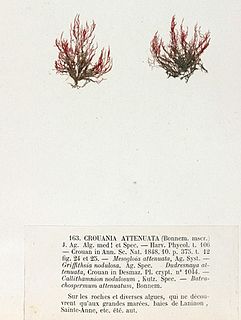
Crouania is a genus of red algae (Rhodophyta) in the Callithamniaceae family. The name of the genus honours the Crouan brothers, Pierre-Louis Crouan and Hippolyte-Marie Crouan. It was first described by Jacob Georg Agardh in 1842, and the type species is Crouania attenuata.
Eudesme is a genus of brown algae belonging to the family Chordariaceae.
Cladosiphon is a genus of brown algae belonging to the family Chordariaceae.

Endocladia is a genus of red algae belonging to the family Endocladiaceae.

Gymnogongrus is a genus of red algae belonging to the family Phyllophoraceae.
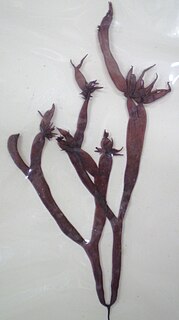
Gloiopeltis is a genus of red algae belonging to the family Endocladiaceae.
















